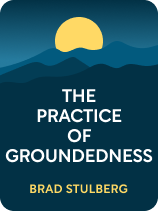

This article is an excerpt from the Shortform book guide to "The Practice of Groundedness" by Brad Stulberg. Shortform has the world's best summaries and analyses of books you should be reading.
Like this article? Sign up for a free trial here.
Do you want to learn how to accept reality and be happy? What does it take to be happy with how things are?
Learning how to accept reality and be happy requires an objective perspective paired with self-compassion. Looking at your life this way can help you be more content regardless of your circumstances.
Keep reading to learn how to become more comfortable accepting reality.
Accepting Your Reality
A key element of groundedness is seeing your reality for what it is and accepting it with compassion and understanding. When we face difficult circumstances, we can either learn how to accept reality and be happy in spite of our circumstances, or we can ignore the severity of our problems and refuse to acknowledge the causes behind them. Ignoring them only causes more pain and suffering because ignoring our problems won’t make them go away. Instead, our problems linger, causing us to feel more negative emotions like frustration, shame, and sadness.
For example, if you’re struggling with financial debt because of poor spending habits, downplaying the severity of your debt will prevent you from taking positive steps. You’ll likely continue spending beyond your means and will accumulate even more debt, which will only push you further into emotional distress.
(Shortform note: Experts say that ignoring and avoiding problems is ineffective for two reasons. First, by avoiding a situation, we reaffirm our belief that the situation is frightening or dangerous. Second, avoidance can become addictive. Each time we avoid a situation, we experience a sense of relief which our brains interpret as a reward, which further motivates us to keep evading the situation.)
When we reject reality, we tend to pursue band-aid solutions rather than address the root cause of our unhappiness. This can lead to unhealthy ways of coping, such as distracting yourself with video games and social media instead of admitting that you’re overburdened.
(Shortform note: In Daring Greatly, Brené Brown describes these methods of coping as numbing behaviors—or anything we do to allow us to evade feelings of pain, anxiety, and shame. She argues that people engage in numbing behaviors to avoid feeling vulnerable. However, when we suppress our vulnerability, we also prevent ourselves from feeling worthiness, connection, and belonging. Brown adds that while numbing may momentarily guard us from unpleasant emotions, it also keeps us from experiencing the depths of positive emotions, restricting our ability to experience life fully.)
Accepting your present reality means being honest with yourself about where you’re at and what problems you’re dealing with—be it a financial issue or a stressful work project. This doesn’t mean you give up and stop trying to work through the situation, but that you recognize what you can and can’t control. Instead of wishing things were different, you can use what resources you have, work with the current situation, and take productive action to solve your problems. For example, if you acknowledge your financial situation, you can start working toward managing your debt.
(Shortform note: In Radical Acceptance, Tara Brach says to truly accept reality, you must stop trying to achieve perfection and decenter yourself from the situation. This means divorcing your identity from the picture and seeing that the situation isn’t about you but that it simply exists. This detachment forms a key component of radical acceptance, a meditative practice rooted in Buddhist teachings. Brach argues that you must both see your reality clearly and respond with compassion. If you recognize reality but don’t have compassion, you won’t be able to cope in healthy and productive ways. Conversely, if you have compassion but lack recognition, you’ll feel trapped in self-pity.)
Here several exercises that can help you accept your present reality:
Use Acceptance and Commitment Therapy (ACT)
You can better accept your reality by using acceptance and commitment therapy (ACT). ACT outlines three steps that can help you open up to your difficult emotions and experiences instead of avoiding or suppressing them:
1. View your situation like a distant observer. Take on the perspective of a neutral third party and evaluate the facts as they are, without any personal judgment or emotional interpretations. This helps you gain distance from your problems and feel less trapped or helpless.
2. Act, don’t react. Once you’ve evaluated your situation from an objective standpoint, carefully choose what action to take instead of letting emotions (like anger or fear) dictate what you do. Determine how you want to respond by reflecting on your core values (values you consider most important—such as honesty and forgiveness). This allows you to act in the most productive way possible.
3. Take your decided action regardless of how you might feel. You can’t change your circumstances by merely wishing you could feel less sad or frustrated. You can only improve your situation—and your emotions—by taking action.
| Connecting With Your Observing Self In The Happiness Trap, psychologist and ACT trainer Russ Harris provides additional insights and tips on how ACT works, which can help you achieve greater success with the three steps outlined above. Harris explains that there are two “selves” in your mind: your observing self and your thinking self. Your observing self simply notes the thoughts you think, the sensations you experience, and your physical surroundings. Your thinking self, on the other hand, judges and interprets them. The problem with judgments and interpretations is that we often mistake them for objective reality, says Harris. He writes that you can connect with your observing self and gain distance from your situation if you defuse your thoughts. You can do this by: 1. Seeing your thoughts as merely words and images 2. Believing your thoughts only have significance if you judge them as useful 3. Not believing what your thoughts tell you to do (as advised in the second step) 4. Not experiencing negative thoughts and images as threats To take action according to your values, Harris recommends you first identify what your values are in 10 areas (family, romantic relationships, friendships, work and career, education and personal development, spirituality, citizenship and community, environment and nature, health and wellness, and leisure). Then, set short-term and long-term goals based on those values and create action plans for achieving them. |
Practicing Self-Compassion
Practicing self-compassion can also help you be more accepting of your reality. Self-compassion is simply being kinder to yourself. When you don’t treat yourself with kindness—when you blame and judge yourself—you feel guilt and shame. These emotions prevent you from seeing a situation clearly and thus knowing how to deal with problems effectively. Being kinder to yourself, however, allows you to move beyond feelings of guilt instead of wallowing in them, which enables you to properly assess a situation and take steps to improve it.
(Shortform note: In Radical Acceptance, Tara Brach defines compassion as responding to pain with love and tenderness instead of resistance. Brach acknowledges that this can be difficult—shame and pain can prevent you from being kind to yourself. She suggests, if you find this is true, that you reach out to others for help. This is an alternate approach to self-compassion that she calls mindful prayer, through which you reach outward for help, love, and support as you try to respond to your pain with understanding and kindness. Doing this can help you accept your pain and become more compassionate towards it.)
Here are two ways to practice more self-compassion:
1. Say “want” instead of “should.” When you use the word “should,” you aren’t accepting reality but are instead wishing for a different situation. This causes feelings like guilt and frustration. “Want,” on the other hand, helps you accept and work with reality to move toward a more desirable outcome.
(Shortform note: In Nonviolent Communication, Marshall B. Rosenberg explains that statements using “should” are a form of moralistic self-judgment—they’re demands, not requests, since we punish ourselves if we don’t comply with them. To rewrite your inner dialogue to be more compassionate, he suggests you phrase the issue as: “When a happens, I feel b because I need c. Therefore, I would like to d.” For example, you could rephrase the self-critical assertion “I’m wasting my education. I should do more with my life” with “When I spend this much time at home, I feel depressed because I need professional fulfillment. Therefore, I would like to get a part-time job.”)
2. Treat yourself like a baby. If a baby was upset, you wouldn’t scold them or tell them to stop crying—that would only make things worse. Instead, you would comfort them or let them cry until they calm down. Similarly, be gentle with yourself and allow yourself to experience your emotions without judgment.
(Shortform note: This advice is based on the assumption that it’s important to handle children’s feelings with care and sensitivity. In Emotional Intelligence, Daniel Goleman echoes this sentiment, explaining that the way our feelings were treated when we were children significantly influences our ability to deal with emotions and empathize with others as adults. Scolding crying children teaches them that emotions should be punished whereas comfort teaches a healthier model—to not judge emotions but to let them run their course. The same principle applies to how we should treat ourselves when we’re in a vulnerable state—essentially, when we’re growing into a stronger way of coping.)

———End of Preview———
Like what you just read? Read the rest of the world's best book summary and analysis of Brad Stulberg's "The Practice of Groundedness" at Shortform.
Here's what you'll find in our full The Practice of Groundedness summary:
- How "hustle" culture leads to burnout, illness, and unhappiness
- The six principles of groundedness to keep you balanced and stable
- Why you should create deep, quality relationships rather than many shallow ones







ACT might work for me. I need help to accept reality instead of pretending things in my life are okay. Thank you.